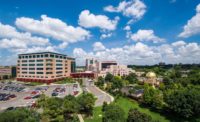A nearly $2-billion funding plan approved by University of Tennessee trustees signals the go-ahead for 15 new capital projects at five locations including research, science and housing facilities along with a planned entertainment district for Neyland Stadium, home of the university's football team.
At its annual meeting June 30, the university's Board of Trustees approved capital outlay plans through fiscal year 2028-29, including more than $1.54 billion for new construction and major renovation, almost $364 million for capital maintenance projects and $4.5 million for related demolition.
The largest project is a $350-million College of Medicine building on the University of Tennessee Health Science Center (UTHSC) campus in Memphis.
Plans call for a $231.6 million Interdisciplinary Health, Research and Clinic building and $199-million chemistry building, both at the Knoxville campus, according to the UT master plan announced earlier this year and the funding approval in June. A construction timeline has not been set, and demolition work is needed before the two Knoxville projects can begin – including knocking down the 1920s-era Jessie Harris Building, scheduled to receive funding in FY 2027-28, and the Panhellenic Building, built in 1964, which will be funded in FY 2024-25.
Funding also includes $271.8 million for an interdisciplinary research building; $188.6 million for an interdisciplinary academic building; $120 million for a research lab facility; and $96.4 million for an addition and renovation of Fletcher Hall. Another $9.6 million is slated for interior and exterior upgrades, including asbestos removal and roofing, at UT Chattanooga's Cadek Hall.
The bulk of the five-year maintenance plan is set for fiscal years 2024-25 and 2025-26, with 41 projects planned totaling $173.2 million.
Three new multi-use student housing facilities also are planned through a public-private partnership, the university announced in May, a project awarded by the State Building Commission to RISE Real Estate of Valdosta, Ga.
The projects are awaiting state approval, then will be delivered through a ground lease structure while the university retains ownership of the land. RISE will develop, finance and construct the facilities, while specialized national non-profit owner, Provident Resources Group, will own the project facilities for the term of the ground lease.
Knoxville Vice Chancellor and Director of Athletics Danny White has also initiated the exploration of a public-private partnership for development of the waterfront near historic Neyland Stadium.
The proposed Neyland Entertainment District along the Tennessee River would include a boutique hotel, condominiums and conference spaces at Neyland Stadium and Thompson-Boling Arena. University partner Brailsford & Dunlavey, has issued a formal Request For Information to gain input and gauge interest from developers on the feasibility of the project.
"Neyland Stadium has always been known for having one of the best gameday environments in college football," said Chancellor Donde Plowman, speaking in June to the Rotary Club of Knoxville. "This project has the potential to create a year-round destination that engages the Tennessee River waterfront and enhances the campus and our community."




